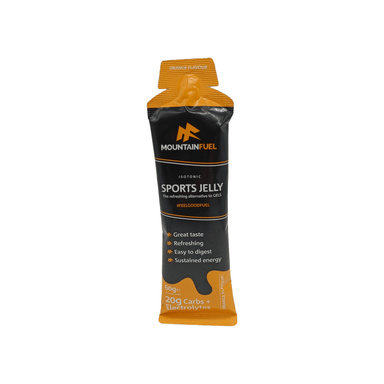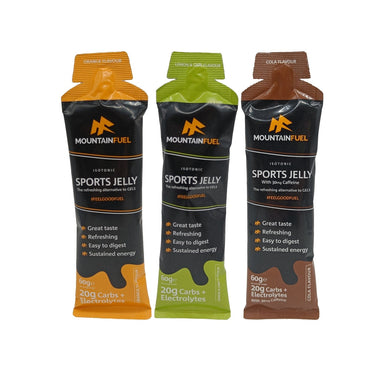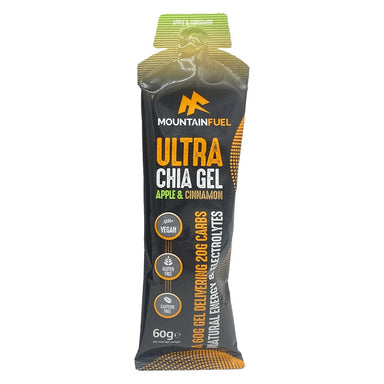

Gelée Sportive Hydrogel
Description Mountain Fuel Hydrogel Sports Jelly est l'un des moyens les plus efficaces, pratiques et efficaces de faire le plein pour les activi...
Afficher tous les détailsLivraison en France avec FedEx
Livraison en Belgique avec FedEx
Montant maximal de la commande : 150 €. Voir les frais de livraison internationaux/UE.




Popular Brands
Popular Products
Popular Fuel Brands
Popular Fuel Products

Sponsored
Gel de performance

Sponsored
BAR30

Sponsored
MIX+

Sponsored
Pastilles énergétiques

Sponsored
Blocs énergétiques à la goyave

Sponsored
Mélange de récupération Tailwind

Sponsored
Mélange pour boisson d'hydratation sportive Skratch Labs

Sponsored
Fusée de poche

Sponsored
Puresport Energy Gel

Sponsored
Clif Blocks
Popular Hydration Brands
Popular Hydration Products

Sponsored
SLT+

Sponsored
Electrolytes

Sponsored
Comprimés d'électrolite

Sponsored
Noyau 500

Sponsored
Boisson Électrolytique Intelligente Hydrate

Sponsored
Ultra Électrolytes

Sponsored
Boisson d'hydratation TORQ

Sponsored
Mélange pour boisson aux électrolytes et aux glucides

Sponsored
Onglets Hydro OTE

Sponsored
Unsweetened Hydration Sport Drink Mix
Popular Recovery Brands
Popular Recovery Products

Sponsored
:RÉPARATION

Sponsored
Barre protéinée à tout moment

Sponsored
BAR+

Sponsored
Boisson de récupération bêta

Sponsored
Barre protéinée enrobée de chocolat

Sponsored
INFUSION À FROID

Sponsored
Lactosérum critique

Sponsored
Énergie + Protéines en poudre

Sponsored
Barres croquantes riches en protéines

Sponsored
03 Après
Popular Health Brands
Popular Health Products
Popular Équipement et technologie Brands
Popular Équipement et technologie Products
Popular Offres tendance Brands
Popular Offres tendance Products

Sponsored
Pack de formation d'automne Truefuels

Sponsored
Ceinture Pro gratuite

Sponsored
Pack de variétés de gels énergétiques isotoniques GO

Sponsored
Bandeau de sport

Sponsored
Pack de démarrage INFINIT

Sponsored
Kit de dégustation STYRKR

Sponsored
Sandales de récupération Ooriginal Sport

Sponsored
Bonnet de bain en néoprène Propel

Sponsored
Pack d'échantillons PILLAR 7 jours

Sponsored
Chaussettes hautes de compression The Run
Plongez dans un monde de possibilités énergétiques infinies avec notre large gamme de gels énergétiques pour le cyclisme, disponibles dans une multitude de formes, de saveurs et de formats. Conçus pour reconstituer vos réserves de glucides épuisées lors d'entraînements intenses, de courses ou dès que vous avez besoin d'un petit coup de boost, nos gels énergétiques pour le cyclisme révolutionnent vos performances.
La meilleure façon de rester énergique pendant votre entraînement est de prendre un gel énergétique, une excellente source de glucides.
Quelle que soit votre distance, il est essentiel de comprendre comment les gels énergétiques fonctionnent avec votre corps.
Les gels énergétiques sont devenus un choix populaire pour fournir une source d’énergie rapide et pratique pour maintenir les performances.
Les gels énergétiques sont probablement le moyen le plus pratique et le plus efficace de s'alimenter à vélo. Que vous participiez à un 50 km, un Century ou plus, il est essentiel de comprendre l'action des gels énergétiques sur votre corps et de savoir quand et comment les utiliser pour maximiser vos performances.
Votre corps utilise deux sources d'énergie pour nourrir vos muscles : les lipides et les glucides. Bien que les lipides soient largement disponibles, leur décomposition en énergie utilisable est plus lente, ce qui les rend moins efficaces lors d'une épreuve cycliste d'endurance de 2 à 3 heures.
Cela signifie que votre corps dépendra des glucides comme principale source d'énergie. Or, votre corps ne peut stocker qu'une quantité limitée de glucides dans les muscles, appelée glycogène.
Par exemple, pour une activité physique à un rythme soutenu, cela équivaut à environ 90 minutes d'effort ; pour une activité d'endurance régulière, cela représente environ 120 minutes (2 heures). Voici les points clés pour comprendre quand et pourquoi vous devez commencer à vous ravitailler.
Dans leur forme la plus simple, les gels énergétiques fournissent des sucres simples qui sont d'abord absorbés dans la circulation sanguine sous forme de glucose, vous procurant ainsi un regain d'énergie. Le glucose est ensuite absorbé par les muscles et les organes actifs.
Chaque gel fournit entre 15 et 45 minutes d'énergie avec environ 25 g de glucides, sous forme de sucres simples, une source d'énergie accessible à votre corps.
Cependant, il ne s'agit pas uniquement de glucides, selon le gel énergétique, d'autres ingrédients ont été ajoutés pour vous aider à booster vos performances :
CAFÉINE - Peut améliorer la vigilance et la concentration, les temps de réaction et la capacité à pousser plus fort pendant plus longtemps en réduisant la perception de l'effort.
SODIUM (ÉLECTROLYTES) - Le manque de sodium peut provoquer - des crampes musculaires, des maladies liées à la chaleur, une incapacité à se réhydrater correctement, un risque accru d'hyponatrémie.
ACIDES AMINÉS (BCAA) - Les acides aminés sont les éléments constitutifs des muscles. De faibles niveaux d'acides aminés à chaîne ramifiée (BCAA) peuvent contribuer à la fatigue ou à la perception de fatigue par un processus appelé « fatigue centrale ».
Remarque : la caféine étant un stimulant, pensez à alterner entre les gels contenant de la caféine et ceux sans caféine pour vous assurer de ne pas en consommer trop.
Bien s'alimenter est essentiel. N'attendez pas d'en avoir besoin, car ce sera trop tard. C'est la principale raison pour laquelle les gens disent être à bout de forces. Le moment idéal pour consommer un gel énergétique dépend de vous et de votre corps.
Le calcul normal est que vous ressentirez les effets d’un gel énergétique environ 15 minutes après sa consommation.
Doubler la consommation n'est pas la solution, en prendre deux à la fois ne signifie pas que vous obtiendrez deux fois plus d'énergie, mais plutôt que vous risquez de vous effondrer pendant que votre corps tente de traiter le sucre.
À titre d'exemple pour les cyclistes effectuant de longues sorties, voici un guide utile pour savoir quand prendre un gel énergétique en utilisant un gel de consommation de 45 minutes :
50 MILE/80K RIDE (3 gels)
- Départ (jusqu'à 15 minutes avant le début de la course)
- Miles 15 et 30
100 MILE/160K RIDE (5 gels + réserve)
- Départ (jusqu'à 15 minutes avant le début de la course)
- Mile 20, 40, 60, 80
- Ayez une roue de secours pour les 90 kilomètres et plus
Vous chercherez à faire le plein de carburant via des gels environ toutes les 45 à 60 minutes (15 à 20 miles) entre les gels, en veillant à ne pas surcharger votre estomac avec l'apport de trop de sucre simple à la fois.
ATTENTION - Guides basés sur des gels à prendre toutes les 45 minutes .
Vérifiez toujours l’emballage des gels énergétiques pour connaître les informations de consommation.
Certaines marques de gels énergétiques recommandent un gel toutes les 15 à 20 minutes (3 par heure), tandis que d'autres sont conçues pour être prises toutes les 45 minutes. Imaginez : est-ce que vous voudriez vraiment consommer plus de 12 gels énergétiques sur une course de 160 km ? Ou est-ce que six gels d'une marque différente seraient plus efficaces ? Le problème, c'est que lorsqu'on manque d'énergie, un gel énergétique ne suffit pas toujours.
C'est une question très fréquente, et chacun a ses goûts. Cependant, les gels à base d'eau ont généralement une consistance variable, allant d'une texture moelleuse et épaisse à une consistance semblable à celle d'une boisson, avec un goût plus ou moins prononcé.
Avec une telle variété de saveurs disponibles sur le marché, des agrumes aux desserts les plus gourmands, en passant par votre expresso préféré, la seule façon de savoir vraiment ce que vous cherchez est de tester plusieurs marques différentes pour trouver la consistance et la saveur qui vous conviennent.
Entraînez-vous, entraînez-vous, entraînez-vous. En matière de nutrition, il est essentiel de disposer d'une méthode éprouvée pour obtenir l'apport énergétique nécessaire bien avant le jour J, et c'est également le cas avec les gels énergétiques.
Tout au long de votre entraînement, vous augmenterez les kilomètres et le meilleur moment pour tester les produits est lors des longues sorties pour vous assurer de savoir quand et quels gels énergétiques vous conviennent le mieux.
Il est toujours préférable de prendre des gels énergétiques avec de l’eau, mais ce n’est pas nécessaire avec certains gels énergétiques.
Sans eau, certains gels énergétiques seront plus longs à digérer et à pénétrer dans la circulation sanguine, ce qui ralentira les performances. De plus, ne prenez pas de gels énergétiques avec une boisson énergétique, sauf si vous prévoyez de les consommer. La prise combinée de gels énergétiques et d'une boisson énergétique vous expose au risque d'un apport excessif en sucres.
Les gels et les chewing-gums énergétiques sont des choix populaires auprès des personnes actives à la recherche d'une source rapide et pratique de glucides pour booster leur énergie et leur endurance. Chaque produit présente ses avantages et ses inconvénients, et le choix du produit le plus adapté dépendra de vos préférences et de vos besoins personnels.
Les gels énergétiques offrent un moyen rapide et facile de consommer des glucides et des électrolytes, mais peuvent ne pas convenir à ceux qui n’aiment pas la texture ou le goût.
Les produits énergétiques à mâcher, en revanche, offrent un goût et une texture plus attrayants, mais peuvent prendre plus de temps à consommer et peuvent ne pas convenir aux personnes ayant des restrictions alimentaires.
Pour trouver la solution idéale, il est important de suivre vos expériences avec différents produits, de noter ce qui fonctionne et ce qui ne fonctionne pas, et d'apporter les ajustements nécessaires. Découvrez les principales différences entre les gels énergétiques et les chewing-gums énergétiques dans notre article ici.

 Offres multi-packs
Offres multi-packs
Description Mountain Fuel Hydrogel Sports Jelly est l'un des moyens les plus efficaces, pratiques et efficaces de faire le plein pour les activi...
Afficher tous les détails
 Offres multi-packs
Offres multi-packs
Description Mountain Fuel Hydrogel Sports Jelly Plus est un gel énergétique rafraîchissant qui fournit à la fois hydratation et énergie, dans un...
Afficher tous les détails
 Offres multi-packs
Offres multi-packs
Les gels Ultra Chia de Mountain Fuel sont fabriqués à partir d'ingrédients végétaliens entièrement naturels, en particulier de graines de chia moul...
Afficher tous les détails
